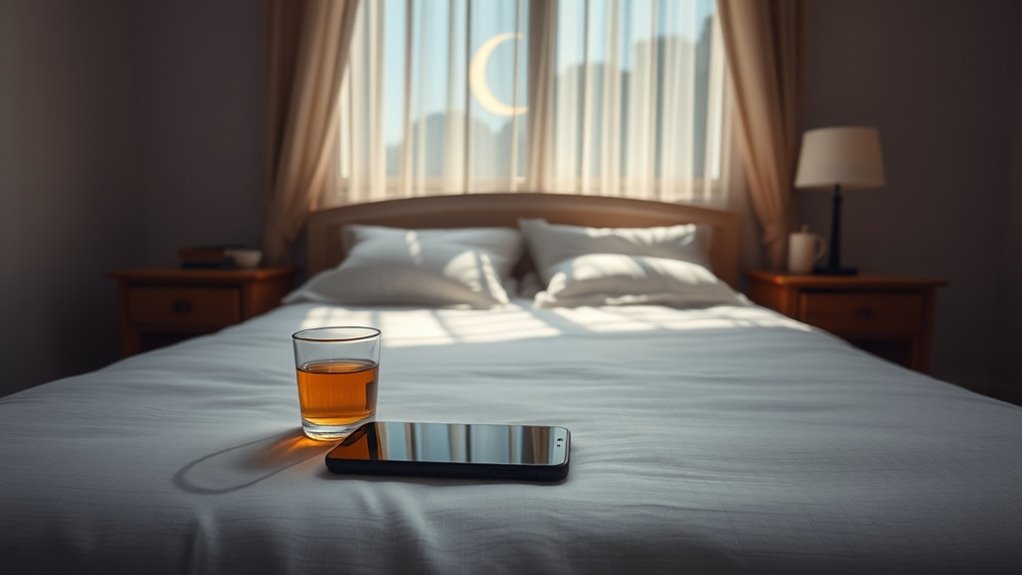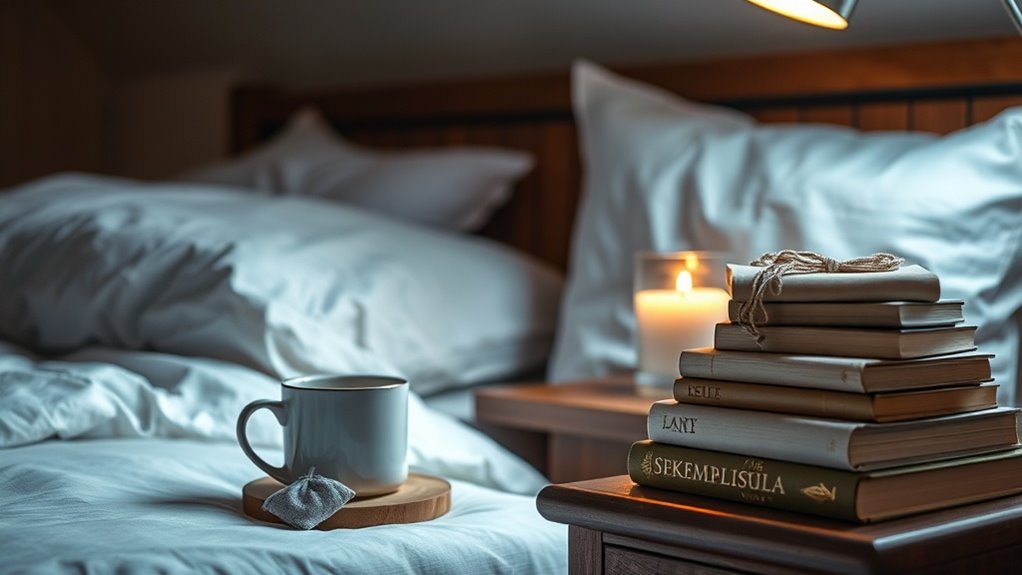The One Night Habit That Helped Me Sleep Deeper
You’re tired of tossing and turning, frustrated by restless nights, and eager for rejuvenating sleep. Understanding how habits influence your sleep quality is crucial for enhancing your overall well-being. One simple change can make all the difference. This habit not only helps your mind unwind but also promotes deeper, restorative sleep cycles. Curious about what this transformative practice is and how it can fit into your life? Let’s explore its impact together.
Key Takeaways
- Establish a consistent bedtime and wake-up time to regulate your internal clock and improve sleep quality.
- Limit screen time by turning off devices at least one hour before bed to reduce blue light exposure.
- Create a calming wind-down routine with activities like reading or meditation to signal your body it’s time to sleep.
- Optimize your sleep environment by keeping the room cool, dark, and quiet for deeper, uninterrupted sleep.
- Track your sleep patterns to identify habits and make adjustments for better sleep quality over time.
Understanding the Importance of Sleep
Have you ever wondered why sleep is so crucial for your overall well-being?
Quality sleep plays a vital role in your physical and mental health.
Establishing a consistent sleep habit helps regulate your body’s internal clock, promoting restorative processes like memory consolidation and tissue repair.
When you prioritize sleep, you’re not just recharging; you’re enhancing your mood, cognitive function, and immune response.
Neglecting this essential need can lead to long-term health issues, such as anxiety and chronic fatigue.
Additionally, prioritizing sleep can significantly improve your overall quality of life by reducing stress and increasing resilience.
By understanding the importance of sleep, you can make informed choices that contribute to a healthier, happier life.
The Science Behind Sleep Quality
To improve your sleep quality, it’s essential to understand the different stages of the sleep cycle and how they affect your rest.
Your sleep environment plays a critical role in facilitating or hindering these stages. Additionally, sleep environment optimization can significantly enhance the quality of your sleep by reducing distractions and promoting relaxation.
Sleep Cycle Stages
Understanding sleep cycle stages is crucial for improving sleep quality.
Each night, you experience multiple cycles, typically lasting about 90 minutes, consisting of light sleep, deep sleep, and REM sleep.
Light sleep helps with relaxation, while deep sleep is essential for physical restoration and immune function.
REM sleep, on the other hand, plays a vital role in memory consolidation and emotional regulation.
Disruptions in these stages can lead to fatigue and cognitive issues.
Impact of Sleep Environment
How does your sleep environment influence the quality of your rest? Factors like light, noise, and temperature significantly impact your sleep. A well-optimized environment can enhance your sleep cycle, promoting deeper rest. Here’s a quick look at these elements:
| Factor | Ideal Condition |
|---|---|
| Light | Dark, with blackout curtains |
| Noise | Quiet, or white noise |
| Temperature | Cool (60-67°F or 15-19°C) |
| Bedding | Comfortable, supportive |
My Journey to Discovering the Habit
As you explore your path to better sleep, you might find that transforming your sleep environment is just as crucial as adjusting your evening routine. Small changes, like dimming the lights or decluttering your space, can significantly impact your sleep quality. Incorporating a soothing bedtime routine can further enhance your ability to relax and drift into deeper sleep.
Sleep Environment Transformation
Transforming your sleep environment can significantly enhance your nightly rest.
By making simple adjustments, you can create a space that promotes deeper sleep.
Consider these elements:
- Temperature: Keep your room cool, ideally between 60-67°F (15-19°C).
- Light: Use blackout curtains to block out external light sources.
- Noise: Incorporate white noise or earplugs to minimize disturbances.
- Bedding: Invest in comfortable pillows and a supportive mattress.
- Aromatherapy: Use calming scents like lavender to promote relaxation.
These changes can help you fall asleep faster and achieve more restorative sleep, ultimately improving your overall well-being.
Evening Routine Changes
What if you could enhance your sleep quality simply by tweaking your evening routine? Small changes can have a profound impact on your rest. I found that by implementing a few strategic adjustments, I began to sleep deeper. Here’s a simple table to illustrate these changes:
| Change | Action | Benefit |
|---|---|---|
| Limit screen time | Turn off devices 1 hour before bed | Reduces blue light exposure |
| Establish a wind-down period | Engage in calming activities (reading, meditation) | Signals your brain it’s time to sleep |
| Set a consistent bedtime | Go to bed and wake up at the same time daily | Regulates your body’s internal clock |
These steps transformed my nights. Try them for better sleep!
Implementing the Habit in Your Routine
How can you seamlessly incorporate a new habit for deeper sleep into your daily routine?
Start by making small, manageable changes that fit your lifestyle.
Consistency is key, so focus on these strategies:
- Set a specific bedtime each night.
- Create a calming pre-sleep ritual, like reading or meditating.
- Limit screen time at least an hour before bed.
- Keep your sleep environment cool and dark.
- Avoid caffeine and heavy meals in the evening.
Integrating a simple evening routine can help enhance relaxation and signal to your body that it’s time to wind down for the night.
Tracking Progress and Adjustments
Once you’ve established your new sleep habits, tracking your progress becomes vital to ensuring they’re effective. Regularly assessing your sleep quality helps identify what’s working and what needs adjustments. You can use a simple tracker to note patterns, which can be enlightening. Additionally, it’s important to recognize common sleep mistakes that may be impacting your progress.
| Week | Sleep Quality | Adjustments Made |
|---|---|---|
| 1 | Good | None |
| 2 | Fair | Reduced caffeine |
| 3 | Excellent | Maintained routine |
Pay attention to any correlations between changes and your sleep quality. This data-driven approach will empower you to refine your habits for deeper, more restorative sleep.
Long-Term Benefits of Improved Sleep
Improved sleep brings a wealth of long-term benefits that can significantly enhance your overall well-being. By prioritizing quality rest, you’ll likely experience:
- Enhanced cognitive function and memory retention
- Better emotional regulation and reduced anxiety
- Strengthened immune system and overall health
- Improved physical performance and recovery
- Increased productivity and creativity
These benefits create a positive feedback loop, making it easier to maintain good sleep habits. Additionally, adopting simple tips for better sleep can lead to more restful nights and improved overall health.
As you continue to sleep better, you’ll find that your daily life becomes more manageable, fulfilling, and enjoyable.
Embracing improved sleep isn’t just a short-term fix; it’s an investment in your future health and happiness.





